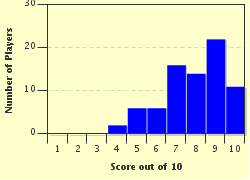Quiz Answer Key and Fun Facts
1. Bernard Herrmann's first shot at a film score was for a 1941 film which has often been voted as one of the greatest American films of all time. It's a haunting score which echoes brilliantly the rise and fall of a larger than life character.
2. Bernard Herrmann's score for this 1951 science fiction film directed by Robert Wise was his first after moving to Hollywood. The film tells the story of a Christ-like figure, Mr Klaatu, sent to Earth to warn the us that if we continue to threaten the well-being of other planets, "this Earth of yours will be reduced to a burned-out cinder." Which film am I talking about?
3. Bernard Herrmann's first score for Alfred Hitchcock was for this 1955 black comedy which revolves around the dilemma of what to do with a corpse. Which film am I talking about?
4. Bernard Herrmann provided the score for a 1959 silver-screen adaptation of an 1864 science fiction novel by Jules Verne. The film starred James Mason as Sir Oliver Lindenbrook and Pat Boone as his singing assistant. Which film am I talking about?
5. Bernard Herrmann's score for J. Lee Thompson's tense thriller starring Gregory Peck and Robert Mitchum was so good that Elmer Bernstein reworked it for the Martin Scorsese-directed 1991 remake starring Nick Nolte and Robert De Niro. Which film am I talking about?
6. Bernard Herrmann scored the music for several films which boasted the stop-motion animation genius of Ray Harryhausen. Which 1963 interpretation of Greek mythology, directed by Don Chaffey and starring Todd Armstrong and Honor Blackman, did they both work on?
7. Bernard Herrmann was chosen by Franšois Truffaut to provide the soundtrack to his 1966 adaptation of a dystopian Ray Bradbury novel. The film stars Oskar Werner, and sees Julie Christie playing two roles. Which film am I talking about?
8. Quentin Tarantino has tipped his hat to Bernard Herrmann twice by using the theme from this 1968 thriller directed by Ray Boulting in both "Kill Bill" and "Death Proof". In the film, a psychopath calling himself Georgie feigns mental retardation in order to get close to a young woman, Susan, he's got a crush on. Which film am I talking about?
9. Bernard Herrmann provided his first of two scores for Brian De Palma in this 1973 psychological horror about a fledgling journalist trying to convince the police that she has witnessed a murder through her apartment window, although nobody seems to be able to find the corpse. Which film am I talking about?
10. Bernard Herrmann's last film soundtrack was for a 1976 film directed by Martin Scorsese. The lead character is a disgruntled Vietnam veteran called Travis Bickle. Which film am I talking about?
Source: Author
thula2
This quiz was reviewed by FunTrivia editor
agony before going online.
Any errors found in FunTrivia content are routinely corrected through our feedback system.

